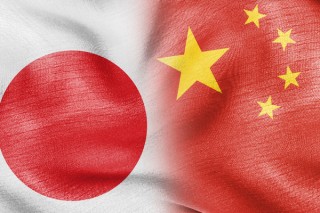Loading
Search
▼ 'Dreaming' About Japan-China Relations
- Category:Other

FORBES
Call me a dreamer, but I believe that relations between China and Japan could, over time—probably a long time—become as cordial and close as those between Japan and the United States.
Japan suffered a devastating defeat at the hands of the Americans, whose retribution included the barbaric firebombing of civilian populations in dozens of cities and, of course, the Hiroshima and Nagasaki a-bombs.
Who would have dreamt that later, and it was not much later–probably around the time that Edwin Reischauer arrived in Tokyo at U.S. ambassador in 1961–the Japan-U.S. love affair would blossom?
My optimism is shared by one of Japan’s most knowledgeable and thoughtful China specialists, Seguchi Kiyoyuki, research director specializing in the Chinese economy and Japan-U.S.-China relations at the Canon Institute for Global Studies (CIGS).
In an interview by Nikkei Business Online published on November 19, within which he laments a pervasive but unwarranted and self-defeating pessimism about China business and investment in Japanese business circles, as well as surveys documenting pervasive mutual antipathy by Chinese and Japanese citizens, Seguchi professes long-term optimism for Japan-China relations.
A frequent traveler to China with a broad range of local contacts, Seguchi refers to a “silent majority” of Chinese who desire improved relations, but whose voices are not heard in Japan (partly, he suggests, due to suppression of unpopular opinion). “I don’t know: It could take 100 years, it could take 200 years, but I think the possibility is there,” he says.
Rather than of centuries, I am thinking of decades, and not many decades. Readers may be surprised to hear it, but, after a period of serious deterioration, trends favoring long-term Japan-China rapprochement and comity have recently been set in place. The trends involve both small, incremental advances and strategic, structural elements. Let us review two of them:
The November 10 Xi Jinping-Age Shinzo APEC meeting lasted only 25 minutes and both leaders put on airs to display a degree of coolness. But the fact that meeting took place was of historic significance, bringing to a close one period of state-to-state relations and opening a new one.
That the meeting was a geopolitical imperative both for China as well as for Japan was apparent from the fact that it took place even while Abe had refused to submit to China’s two publicly stated conditions for the meeting: the first, that Abe acknowledge the “dispute” (i.e., China’s claim to sovereignty) over the Senkaku/Diaoyu islands; and, second, that Abe pledge not visit the Yasukuni Shrine during his term as prime minister.
Seguchi points out that Xi Jinping took a political risk in meeting Abe under these circumstances. He suggests that Xi’s calculus weighed this risk against the requirement for Chinese decorum as APEC host. More important perhaps, was the need to arrest and reverse a recently quickening deterioration in Japanese business sentiment and investment in China. According to Chinese data, first half 2014 Japanese investment was down 48.8% over the comparable 2013 period. Clearly, Xi and his senior advisors saw the latter as a more serious threat.
The Xi-Abe meeting (coming after agreement on purposely vague and ambiguous “four principles”) removed the political barriers to resuming normal state-to-state, government-to-government meetings. More importantly, perhaps, it “reset” the atmospherics of China-Japan relations—including economic and commercial relations—to a pro-active, positive mode.
Following the Xi-Abe meeting, China and Japan started formal talks to address illegal Chinese poaching of red coral in Japanese waters. The talks—the most recent formal session of which took place in Dalian on December 18–produced quick and substantive results: a China’s commitment to strengthen enforcement of their own laws against extraction of environmentally-sensitive red coral; and China’s assent to Japan’s raising to 30 million yen ($255,000) from a previously negligible and ineffective 4 million yen ($34,000) the fine for illegally fishing in Japanese waters.
Japan’s drastically increase fine took effect December 7. Yesterday, December 21, the first arrest for poaching of a Chinese vessel and its crew was made after a 100 kilometer chase by Japan’s Coast Guard in the southern waters of Izu archigelago. The Chinese fishing boat’s captain and 10 crew members were arrested and their boat escorted to Yokohama.
In the past such arrests, and particularly assessment of substantial fines, might have elicited protests from China. None are expected this time. This is a case of pro-active China-Japan cooperation on a matter, as I noted in a previous post (see sidebar) of great symbolic as well as practical importance for China-Japan political relations.
If prospects for true and lasting Japan-China comity are doubtful, it is mainly because of Japan’s role in the Obama administration’s blindly reactive, seemingly inertial anti-China “pivot to Asia” military “grand strategy,” in which the U.S.-Japan alliance is–as the White House never tires saying–the “cornerstone.”
Here, again, however, I see hope. In brief, despite what appears to be Abe’s wholesale and indiscriminate acquiescence to or support for U.S. strategy and alliance demands—most recently the doctrine of “collective security” for Japan’s Self Defense Forces—I perceive his ultimate goal to be to prepare Japan for security independence from the U.S. In this view, his support of the Pentagon’s priorities and initiatives (including a massive new base in Okinawa, ostensibly as a replacement for the U.S. Marines’ Futenma Air Station) is a smokescreen.
He is actually preparing for the day when the United States and China reach agreement on a “new type of great power relations” that eschews counterpoised alliances. Japan’s interests will be best served in adopting the posture of a neutral “Asian Switzerland” between the superpowers.
Of course the scenario I envisage will be played out well beyond the tenures of either Abe or Xi. Am I a dreamer? Maybe, but I am sure that I am not the only one.
- December 23, 2014
- Comment (0)
- Trackback(0)

